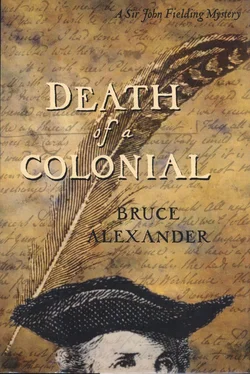Bruce Alexander - Death of a Colonial
Здесь есть возможность читать онлайн «Bruce Alexander - Death of a Colonial» весь текст электронной книги совершенно бесплатно (целиком полную версию без сокращений). В некоторых случаях можно слушать аудио, скачать через торрент в формате fb2 и присутствует краткое содержание. Год выпуска: 1999, ISBN: 1999, Издательство: Putnam Adult, Жанр: Исторический детектив, на английском языке. Описание произведения, (предисловие) а так же отзывы посетителей доступны на портале библиотеки ЛибКат.
- Название:Death of a Colonial
- Автор:
- Издательство:Putnam Adult
- Жанр:
- Год:1999
- ISBN:9780425177020
- Рейтинг книги:3 / 5. Голосов: 1
-
Избранное:Добавить в избранное
- Отзывы:
-
Ваша оценка:
- 60
- 1
- 2
- 3
- 4
- 5
Death of a Colonial: краткое содержание, описание и аннотация
Предлагаем к чтению аннотацию, описание, краткое содержание или предисловие (зависит от того, что написал сам автор книги «Death of a Colonial»). Если вы не нашли необходимую информацию о книге — напишите в комментариях, мы постараемся отыскать её.
Death of a Colonial — читать онлайн бесплатно полную книгу (весь текст) целиком
Ниже представлен текст книги, разбитый по страницам. Система сохранения места последней прочитанной страницы, позволяет с удобством читать онлайн бесплатно книгу «Death of a Colonial», без необходимости каждый раз заново искать на чём Вы остановились. Поставьте закладку, и сможете в любой момент перейти на страницу, на которой закончили чтение.
Интервал:
Закладка:
Claimant: “Yes, forgotten it completely. “
Inskip: “And your Latin?”
Claimant: “I’ve not retained a word of it.”
Inskip: “Then, sir, I would say that your education was altogether wasted upon you.”
Thus did the tutor bait his supposed student. He jeered and made sport of the claimant as he failed to answer one question after another. It seemed likely to me that this was the manner that he employed with most of his students. So was it also with many schoolmasters I had known: The cutting remark often made a greater impression than a ruler across the knuckles.
More important was the claimant’s response to this cruel method. It seemed to hurt him deeply. In spite of myself, I could not but pity the poor fellow, so low was he brought by the tutor’s jabs. I watched as he seemed to unravel like some ill-knit muffler: His eyes brimmed with tears and his chin trembled as he managed by force of will to keep from bursting into an unmanly fit of weeping. He kept control of himself until the end, when Mr. Inskip addressed the commission and inveighed against the claimant as a charlatan, a mountebank, and assured them that had the fellow been who he pretended to be, he would have answered not some but all the questions put to him.
“I remember Lawrence Paltrow very well,” said he. “He was one of the best scholars it has been my pleasure to tutor in the last ten years, at least. Let me add that — ”
Indeed, Mr. Inskip added nothing to that statement, for the claimant then rose to his feet and shouted to the room, “M’lord, and you, gentlemen, I take my leave of you. I am neither charlatan nor mountebank. In truth, I am naught but a poor man tempted into affairs over which he had no control. I’ll not trouble you further!”
And with that he ran from the room, the threatened tears now coursing down his cheeks. Those left behind were quite astonished. Some shouted after him to stop. Others recovered sufficiently to leap to the door in pursuit. But neither shouting nor leaping about did a bit of good. The claimant was truly gone and would not easily be brought back.
Nevertheless, as I looked about the room, I became aware that another of our number was missing. As they milled about, I attempted to ascertain the identity of him who had followed the claimant out the door. I realized with a start that it was none but Sir Patrick Spenser.
We were once more back at Number 4 Bow Street, in the kitchen, and about to sit down to our dinner. Though a good deal of time had passed since the claimant’s departure, much of it had been spent in the residence of the Lord Chief Justice, where an argument raged for near an hour regarding whether or not the claimant had said he would no longer pursue his claim — and if not, what truly had been said. And there were other questions: Had he said he had been tempted into affairs over which he had no control? What had he meant by that? Should they prepare for a case in Chancery? Where had Sir Patrick Spenser gone? Why? And so on, Sir John had remarked sometime afterward that he had hoped that meeting with the claimant would clear up matters; instead, it had served only to complicate them further.
And then there was the matter of Mr. Inskip. It had been agreed that he should have no expenses to pay during this trip, and so he was given a lump sum out of court funds and then conveyed to the Globe and Anchor, the excellent hostelry on the Strand, Sir John had arranged with David Garrick for a seat at that evening’s performance of The Recruiting Officer. Mr. Inskip was well pleased with his trip to London. Once again he was the timid old fellow I had met at the coach yard. Upon parting company with us at the hostelry, he said, “I hope I was of some help to you.” Sir John assured him that he had been, and then remarked to me as our hackney pulled away, “I wonder what got into the fellow.”
But all of that was now past. As Clarissa set the table properly and Annie served up the meal, Sir John seated himself beside Lady Fielding, and I made ready to take my place. Then came a knock upon the door which led to the stairs and the ground floor below, Sir John bade me open it, that he might know what prompted this interruption.
That I did and found Mr. Benjamin Bailey, captain of the Bow Street Runners, awaiting on the other side.
“Who is it?” called Sir John from the table. “Who is there?”
“’Tis I, sir,” said Mr. Bailey. “I’ve news I thought you ought to hear.”
The magistrate sighed deeply. “Give it me, then.”
“One of them from the Globe and Anchor just come by to tell us they got a corpus there in one of the rooms, looks like he killed himself.”
“By what means?”
“Hanged himself, he did.”
“Would he happen to be registered as Lawrence Paltrow?”
“That’s the name the porter gave.”
Sir John rose from the table. “Well, come along, Jeremy. We must see that Eli Bolt, or whatever his name be, does not play the same trick on us a second time.”
TEN
Our arrival at the Globe and Anchor coincided precisely with the departure of Mr. Inskip from the place. He seemed quite taken aback to find us there at the entrance to the hostelry.
“Good God,” said he. “Have you further need of me?”
“No, no, Mr. Inskip,” said Sir John, “nothing of the kind. We’ve some business inside to attend to.” All this was spoken as I tried to push past him, with the magistrate trailing close behind.
“But perhaps I could be of assistance?”
“No, no, go, sir, and enjoy the play. Visit Mr. Garrick afterward.”
“Oh, may I?”
“Yes, goodbye!”
Only then did the tutor give way and allow me to squeeze by, with Sir John clasping my shoulder and Mr. Benjamin Bailey bringing up the rear. I glanced back and saw him staring after us.
“Have we escaped him at last?” Sir John asked me once inside.
“It would appear so,” said I.
“I thought I would have to set Mr. Bailey upon him to get us past. Imagine his dismay to see his victim of the afternoon a supposed suicide. It would quite crush him, I’m sure, for he seems a good man.”
“But a hard master to his scholars.”
“Indeed,” he agreed. “Mr. Bailey?”
“Yes, sir?” The chief constable stepped forward and threw back his shoulders, all but saluting. “Come with us and search for the killer. Perhaps we may discover the room of this Bolt, or Bolton, or whatever his name be. It is, of course, quite unlikely he would still be about, having committed murder, but it would be worthwhile to search what had been his room. The next place to look, I suppose, would be the docks, any ships setting sail for the North American colonies, that sort of thing.”
A well-dressed but distraught-looking young man had approached us meantime and, wringing his hands in a gesture of despair, he addressed us: “Ah, Sir John, thank God you’ve come. I must assure you that nothing of this sort has ever happened here before, sir. This is a most respectful hostelry.”
“So I’ve been given to understand. But tell me, sir, who are you?”
“Oh. Oh, yes, of course, forgive me. My name is Templeton, and I am night manager here.”
“Very good, Mr. Templeton, and was it you who found the body?”
“I. . why, of course not. It was the porter called the situation to my attention.”
“The porter, was it? Then I should like to speak with him.”
“Uh. . yes, of course. Right this way, please.”
And so saying, he did lead us up a staircase which was not nearly so grand as one might expect in such a place. On the floor above, in a corner alcove somewhat removed from the rooms which opened to the hall, we encountered the porter, who sat, polishing shoes.
Читать дальшеИнтервал:
Закладка:
Похожие книги на «Death of a Colonial»
Представляем Вашему вниманию похожие книги на «Death of a Colonial» списком для выбора. Мы отобрали схожую по названию и смыслу литературу в надежде предоставить читателям больше вариантов отыскать новые, интересные, ещё непрочитанные произведения.
Обсуждение, отзывы о книге «Death of a Colonial» и просто собственные мнения читателей. Оставьте ваши комментарии, напишите, что Вы думаете о произведении, его смысле или главных героях. Укажите что конкретно понравилось, а что нет, и почему Вы так считаете.












